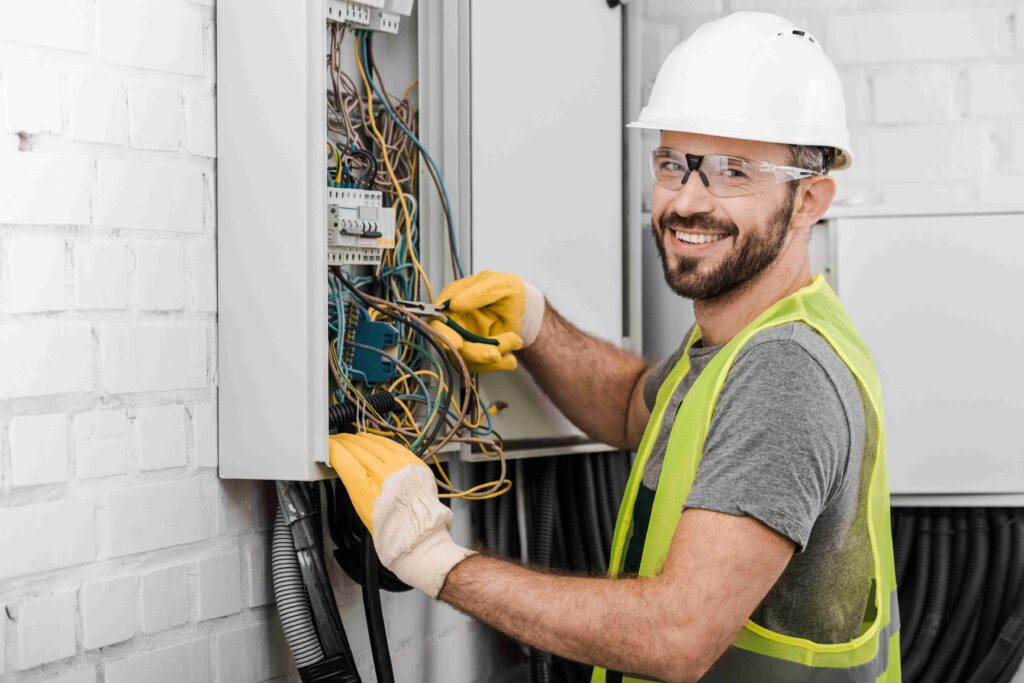Introduction
Electricity powers our homes, offices, and almost every other facet of our modern life. However, as important as it is, working with electricity should not be taken lightly. Whether you’re installing new lighting fixtures, upgrading your electrical panel, or diagnosing wiring difficulties, you should leave these chores to a professional. But not just any professional: a certified and insured electrician. In this post, we’ll look at why it’s critical to engage a certified and insured electrician for all electrical work.
What Does It Mean to Be a Licensed Electrician?
A licensed electrician is a professional who has completed thorough training and testing to receive a certification allowing them to legally do electrical work. To obtain a license, an electrician must complete years of apprenticeship, classroom study, and on-the-job training. They must also pass difficult exams to demonstrate their understanding of electrical theory, safety regulations, and local construction codes.
Licensing ensures that the electrician possesses the essential skills and expertise to carry out electrical work safely and efficiently. It also means they are up to date on the most recent industry norms and laws. When you employ a certified electrician, you can be confident that they will handle your electrical needs with expertise and care.
The Role of an Insured Electrician
Insurance is another crucial consideration when hiring a professional for electrician services. An insured electrician who offers reliable electrician services carries liability and workers’ compensation insurance to protect both the homeowner and themselves in the event of an accident or damage on the job.
Liability Insurance: This includes any damage to your property as a result of the electrician’s work. For example, if a wiring job causes a fire, liability insurance will pay the cost of repairs.
Workers’ Compensation Insurance: This shields you from financial liability if the electrician gets hurt while working on your premises. Without this insurance, you may be liable for medical expenses and lost pay.
Hiring an insured electrician means that you will not face financial consequences if something goes wrong during the project.
The Dangers of DIY Electrical Work
It’s tempting to tackle home renovation work on your own, especially given the quantity of knowledge available online. However, when it comes to electrical repair, doing it yourself can be a dangerous and costly mistake. Here are some risks related to DIY electrical projects:
- Electrical Shocks: Without sufficient education and safety precautions, you risk receiving severe electrical shocks that can be lethal.
- Fire Hazards: Incorrect wiring or overloaded circuits can cause electrical fires, endangering the entire home.
- Code Violations: DIY work frequently violates municipal construction rules, which might result in fines or complications when selling your house.
- Expensive Repairs: Mistakes made during DIY projects frequently necessitate expert repair, which can be more expensive than employing a pro in the first place.
For these reasons, it is always safer and more cost-effective to use a qualified and insured electrician for electrical repairs.
Legal Requirements for Electrical Work
Many regions have stringent legislative criteria for who can do electrical work. These restrictions are in place to ensure both safety and quality. In most regions, it is illegal for an unlicensed individual to undertake electrical work on another person’s property.
If you engage an unlicensed electrician, you could face the following consequences:
- Fines: You may face a fine for allowing unlicensed work to be done on your premises.
- Invalidated Insurance: Your homeowner’s insurance may not cover damages caused by an unlicensed electrician.
- Legal Liability: You may be held accountable for any injuries or damages resulting from unlicensed work.
Hiring a qualified and insured electrician ensures that all work is done correctly and protects you from potential legal and financial consequences.
The Expertise of a Licensed Electrician
Licensed electricians contribute a lot of experience to every project. Their training encompasses a variety of abilities, including:
- Electrical Theory: Understanding the basic concepts of electricity and how it flows.
- Safety Protocols: Know how to use electrical components properly and avoid any hazards.
- Local Codes: Understanding your local building codes and regulations.
- Troubleshooting: Identifying and resolving electrical faults efficiently.
This experience results in high-quality work that adheres to all safety rules. A qualified electrician can swiftly identify and repair problems, ensuring that your electrical system runs properly and safely.
Insurance: Protecting You and the Electrician
When you choose a certified and insured electrician, both you and the electrician are covered. Here’s how.
For Homeowners: If something goes wrong on the job, you are covered. Insurance ensures that you are not left with a financial burden, whether it is due to property damage or an electrician’s injury.
For Electricians: Insurance protects electricians from financial loss if they are harmed on the job or accidentally damage a client’s property. This peace of mind enables them to concentrate on producing their finest work.
Essentially, insurance offers a safety net for everyone involved in the endeavor.
The Cost Factor: Is Hiring a Licensed Electrician Worth It?
Saving money is one of the primary reasons homeowners contemplate hiring unlicensed electricians or doing their own repairs. But is it truly worthwhile?
Hiring a certified electrician may cost more upfront, but the long-term benefits are enormous. Licensed electricians complete the job correctly the first time, avoiding the possibility of costly repairs down the road. Furthermore, their work adheres to local codes, avoiding potential legal complications that could result from non-compliance.
In contrast, unauthorized work frequently results in errors that require costly repairs. The old cliché “you get what you pay for” certainly applies to electrical work.
The Importance of Electrical Code Compliance
Electrical codes are created to assure the safety and dependability of electrical systems. These rules are periodically updated to include new safety standards and technologies. Licensed electricians are obliged to keep up with these codes and ensure that their work complies.
Code compliance is crucial for several reasons:
- Safety: Properly installed and maintained electrical systems are less likely to start fires or cause other problems.
- Legal Requirements: Non-compliant work can result in penalties, legal concerns, or difficulty when selling your home.
- Insurance: Many insurance policies require that electrical work be done to code. Noncompliance may result in refused claims.
Hiring a certified electrician ensures that your electrical work fulfills all applicable safety and legal regulations.
What to Expect When Hiring a Licensed and Insured Electrician
When you employ a qualified and insured electrician, you can anticipate a professional service from beginning to end. Here’s what usually happens:
- Initial Consultation: The electrician will review your requirements, evaluate the project, and provide an estimate.
- Scheduling: A date and time for the work will be scheduled to accommodate your schedule.
- Inspection and Permitting: The electrician will handle any required permits and inspections, ensuring that everything is legal and up to code.
- Completion: The work will be finished efficiently and safely, and the electrician will clean up afterward.
- Final Walkthrough: You will have the opportunity to inspect the work and raise questions.
This approach assures that the job is completed correctly, on time, and with the least disruption to your regular routine.
How to Verify an Electrician’s License and Insurance
Before choosing an electrician, make sure they have the necessary credentials. Here’s how you can accomplish it:
- Ask for Proof: A reputable electrician should be willing to show documentation of their licensure and insurance.
- Check Online: Many states provide online databases where you can check an electrician’s license status.
- Contact the Insurance Company: You can phone the electrician’s insurance company to ensure that their policy is current and covers the job you want.
These measures ensure that you get a knowledgeable specialist who is completely licensed and insured.
The Peace of Mind That Comes with Professional Work
Hiring a certified and insured electrician gives you peace of mind that the work will be done safely, professionally, and lawfully. You don’t have to be concerned about potential risks, legal difficulties, or future maintenance. Instead, you can get the benefits of a fully functional electrical system.
In the end, the value of professional work extends beyond the current project. It is an investment in the security and lifespan of your home.
Case Studies: When Hiring a Licensed Electrician Made All the Difference
Case Study 1: A homeowner hired a certified electrician to upgrade their old electrical panel. During the work, the electrician identified multiple code violations and potential fire concerns. Because of their knowledge, these difficulties were remedied, and the residence is now safer.
Case Study 2: Another homeowner chose to save money and hire an unlicensed electrician. Unfortunately, the work was not done properly, resulting in repeated outages and, eventually, a small electrical fire. The costs of repairs considerably outweighed the savings.
These real-world examples demonstrate the significance of employing a certified and insured electrician. Professional work provides peace of mind and safety, therefore the initial investment is well worth it.
Conclusion
Hiring a certified and insured electrician is not only a good idea but also a must. A competent electrician adds important experience to any electrical installation, assuring safety and compliance while also preserving your financial investment. Don’t take shortcuts when it comes to electrical work. Invest in a professional and insured electrician to ensure long-lasting excellence.




